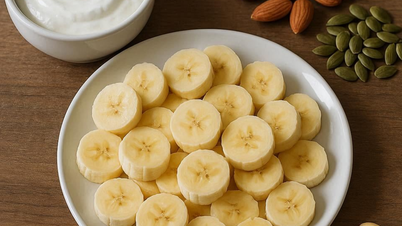The study, led by Dr. Raedeh Basiri, Associate Professor in the Department of Nutrition and Food Studies, George Mason University, (USA), is a long-term clinical trial evaluating the metabolic benefits of mango for people with prediabetes.
The authors divided the participants into two groups: One group ate mango every day, the other group ate low-sugar granola bars. The follow-up period lasted more than 6 months. During this time, the participants' blood sugar levels, insulin response, and body fat were recorded and analyzed.

Eating mangoes properly can help control blood sugar.
Photo: AI
Surprising results: Although the mango contained more sugar (32g) than the low-sugar granola bar (11g), the group that ate mango daily showed significant improvements, according to the Times Of India.
Specifically, mangoes have the ability to better control blood sugar, improve insulin sensitivity and reduce body fat. This proves that not all sweets are bad as long-held beliefs.
According to Dr. Basiri, it's not just the sugar content that's important, but the other nutrients in mangoes. The natural sugars in mangoes come with fiber, vitamins, and other nutrients that provide health benefits. In contrast, added sugars in processed products, even those labeled "low sugar," don't provide the same nutritional value and may even increase the risk of diabetes.
The study authors concluded: Instead of focusing solely on sugar intake, people at high risk of diabetes should pay attention to how sugar is delivered in food. This study opens up a new approach in clinical nutrition, encouraging the use of nutrient-rich fruits such as mangoes to help improve metabolic health. However, experts note that people with diabetes should only eat one or two small pieces of mango at a time.
Source: https://thanhnien.vn/them-bang-chung-khoa-hoc-giai-oan-cho-xoai-ngot-18525092915115214.htm































































































![Dong Nai OCOP transition: [Article 3] Linking tourism with OCOP product consumption](https://vphoto.vietnam.vn/thumb/402x226/vietnam/resource/IMAGE/2025/11/10/1762739199309_1324-2740-7_n-162543_981.jpeg)













Comment (0)